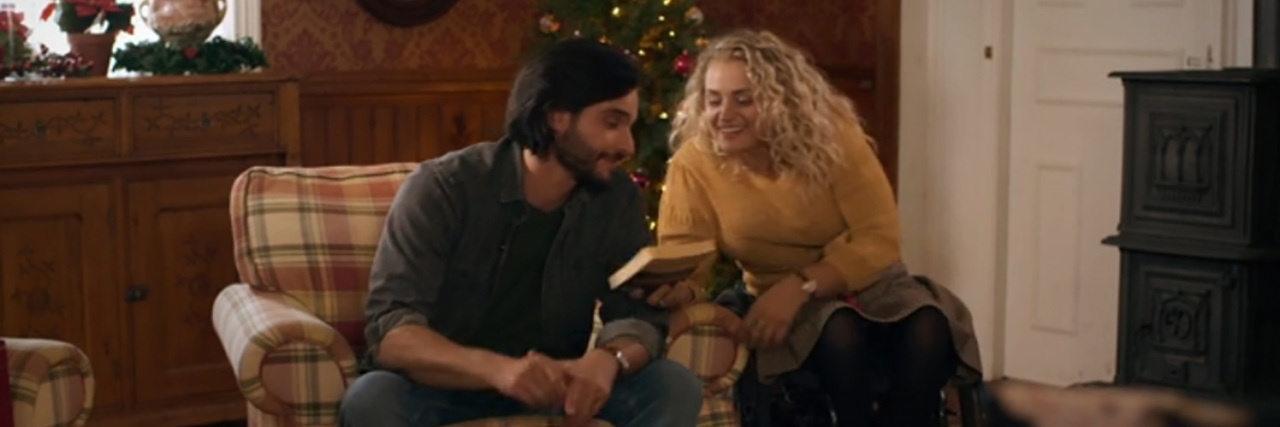Ali Stroker Stars in the Cheesy Lifetime Rom-Com People With Disabilities Deserve
It’s that time of year again — the season for movies with elevated elves, solo sons battling surprisingly sturdy burglars, and choruses of children clad in old curtains. Yes, I love the Christmas classics, but there’s one subgenre I don’t usually embrace: the cheesy holiday romance. My relationship with romantic movies in general can charitably be described as “it’s complicated.” But last night, I nibbled on a gingerbread cupcake and watched something a little outside my usual festive fare — “Christmas Ever After.”
“Christmas Ever After” comes from the network that practically invented the low-budget holiday rom-com: Lifetime. The movie has everything you’d expect: a meet-cute, a charming guy-next-door type, and his lovable family who figure out he and the girl are meant to be together long before he does. Throw in a little love triangle and you have the classic romantic comedy formula — with a twist. What sets “Christmas Ever After” apart from the usual seasonal sentimentality is that its romantic heroine has a disability.
Tony Award winner Ali Stroker, who uses a wheelchair due to a spinal cord injury, plays Izzi, a romance novelist who always spends Christmas in Silver Springs, one of those bucolic New England towns that only exist in holiday movies. This year, she’s trying to finish her latest book by Christmas Eve, but she finds herself distracted by ruggedly handsome Matt (Daniel di Tomasso), who is taking over his dad’s bed and breakfast and mysteriously resembles the hero on the covers of her novels. You can pretty much guess where the story goes from there.
In many ways, there is nothing special about “Christmas Ever After.” The plot is heartwarming, but predictable. It’s your typical corny Christmas romance to watch ironically or as a guilty pleasure while sitting on the couch drinking eggnog on a snowy night. Yet this movie is incredibly important, because it challenges society’s long-held prejudices about who is attractive, who is romantic, who is sexy and who deserves love. It takes a genre usually reserved for able-bodied “perfect” women and opens the door to those of us who are usually left out.
“Christmas Ever After” is also notable in that the lead character’s disability is not a major part of the plot. The conflicts Izzi faces have nothing to do with the fact that she uses a wheelchair. And although Matt is hesitant to pursue a relationship with Izzi, his reasons are unrelated to her disability and he never even brings it up as a consideration. They are just two people facing the same challenges as anyone falling in love — in romcom land, anyway.
Critics of romantic comedies argue that the genre depicts unrealistic and sometimes harmful ideas about relationships and love. Although this is sometimes the case, I believe it is equally if not more damaging to be a teenager or adult who watches these kinds of movies and never sees yourself represented. If the heroine is always white, straight, thin and able-bodied, but you are not, you may start to believe you could never be like her or have what she has. Success? Happiness? Love? Not for you.
Disabled people in books, TV and movies are frequently depicted as asexual, unattractive and unworthy. We almost never get to be the prince or princess, or even the best friend who is secretly in love with the romantic lead and s/he finally notices. Instead, we’re the Hunchback of Notre Dame. The Phantom of the Opera. The star-crossed teens dying together in a hospital. The paralyzed protagonist opting for suicide to “free” their non-disabled lover. Our love at first sight is unrequited, and people like us don’t get to live happily ever after.
After so many years of enduring the media’s negative views of disability and romance, it’s powerful, revolutionary even, to watch a woman find love and never question whether she deserves it because she happens to use a wheelchair. As a domestic abuse survivor, I can’t help but wonder how my life might have been different if movies like “Christmas Ever After” had existed when I was younger. Maybe I wouldn’t have had such low self-esteem that I stayed for years with someone who mistreated me. Maybe I wouldn’t have been seen as an easy target for abuse because of my disability.
I know one thing for sure: disabled girls and women now have an example of what love should be like for us. No, it doesn’t mean we’ll all meet a dashing Daniel di Tomasso (or his equivalent of another gender) in a snowy village a few days before Christmas and things will magically be perfect. But the respect, communication, humor and joy Izzi and Matt share — those are all very real and essential parts of a healthy relationship. We all deserve that kind of love, no matter our race, gender, orientation and/or disability. We shouldn’t settle for less.
Fictional stories affect our real lives. They shape the way society sees us and how we see ourselves. Holiday romcoms are the fairy tales of our time, and no matter how cheeseball they may be, it’s only human to want to see ourselves reflected in the lessons they impart. We want to believe that people like us can find true love. And with movies like “Christmas Ever After” helping to end damaging myths about disability and relationships, perhaps more of us will.
“Christmas Ever After” is regularly airing on Lifetime during the holiday season and can be streamed on demand with a Hulu Live TV subscription.
Image via Hulu.

